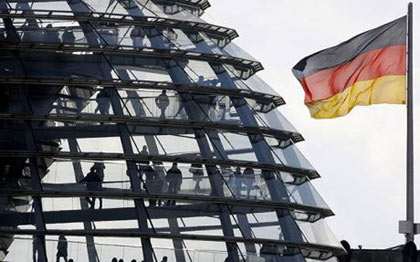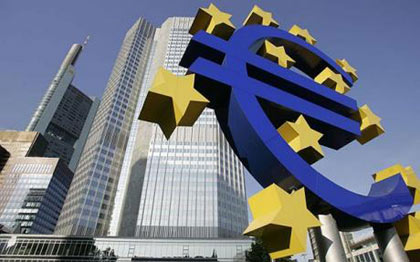You are hereBlogs / WcP.System.Thinker's blog / Buffett said in March, US in recession; now, recession declared by Germany, Italy, 15 Eurozone nations, and Japan
Buffett said in March, US in recession; now, recession declared by Germany, Italy, 15 Eurozone nations, and Japan

(quote)
Germany has become the first of the G7 powers to declare an official recession. After Germany and Italy officially declared recession status, it was the turn of the entire 15-nation euro zone to make a similar declaration on Friday, November 14, 2008.
Gross domestic product in the Eurozone fell by 0.2 percent for a second consecutive quarter in the third quarter, according to figures from Eurostat, satisfying the technical definition for a recession. The contraction means that two of the world's three major economies, Japan and the Europe's euro zone, are now in recession.

Germany and Italy logged third quarter declines on their gross domestic products by 0.5 percent for July to September and 0.4 percent for the second quarter. France narrowly missed joining the recession club because it had a 0.1 percent GDP growth rate in the third quarter after it had a minus 0.3 percent growth in the previous quarter.
Like the UK, the group of 15 countries has been hit hard as the crisis that started in the US banking sector feeds through into the wider economy. The worst affected has been Germany, Europe's biggest economy, where GDP fell by 0.5pc in the third quarter after a 0.4pc in the second. Italy suffered falls of the same proportion in both quarters.

The tiny country of Iceland is suffering near total economic collapse in the wake of the global crisis; in October its stock market crashed and its central bank went bankrupt. The Krona is down nearly 50% against dollar in past 6 months. Iceland receives $2.1 billion from International Monetary Fund, but says it will need $4 billion more.
France however defied expectations and narrowly escaped the fate of its neighbors after the economy grew by 0.1pc in third quarter, following a 0.3pc fall in the second.
The larger 27-member EU bloc has yet to come out with Q3 data on its GDP growth rate, although indicators point to negative news ahead since new passenger cars statistics showed a 14.5 percent decline in October. The EU logged a zero percent growth rate from April to June.

Japan - the world's second-largest economy - is in a recession, government officials announced Monday. Japan's Cabinet Office confirmed that its economy shrank another 0.1% in its third quarter, following a 0.9% drop in the second quarter. The country's gross domestic product -- second to the United States -- has fallen by 0.4% this year, pushing Japan into its first recession since 2001.
In a special interview to CNBC in March 2008, billionaire Warren Buffett, Chairman of Berkshire Hathaway, said the US is indeed in a recession. "However, it is perhaps not as bad as the 1970s." “It is nothing like 1973-74 yet. That doesn’t mean it couldn’t be. But in 1973-74, we had this stagflation situation and really had a meltdown in equity prices. Really good companies got down to 3 and 4 times earnings. So, nothing like that has happened in this situation. But in 1973-74, at some point, it didn’t look like it had happened either. So, everyday is a new day and we are seeing more fixed income type forced liquidations. We are seeing more indigestion; banks with a lot of loans they don’t want to have. You are seeing a time of easy money in terms of price, but not so easy money in terms of availability,” said Buffett.

Excerpts from an exlusive interview with Warreen Buffet:
Q: Let us move on to David from Defiance, Ohio. He asks, 'How would you define a recession?' This is something we talk an awful lot about on the show, but he says, 'I have been listening to a lot of discussions on CNBC, some of which can be very annoying because they tend to be so outrageously vocal and the experts believe two quarters of negative growth qualifies as a recession.' Is that the surest definition of it? Or do you think it's broader than just that?
A: It is the standard definition, but if you think about it, population grows at 1% a year. So you could have growth of GDP at 0.5%, but GDP per capita would be going down. The very definition you might say is a little bit flawed if it doesn’t allow for the fact that GDP per capita can go down while gross GDP is going up. Beyond that, I would say by any common sense definition we are in a recession. We haven’t had two consecutive quarters of GDP growth. But on balance, most people's net worth is heading south now for a considerable period of time. And if you owned a house, and you had an 80 per cent mortgage on it, and so you had 20 per cent equity a year ago, you might not have any equity now. And millions of people are in positions somewhat similar to that, and people that own municipal bonds feel poorer today than they did a few months ago. So business is slowing down. We have retail stores in candy and home furnishings and jewelry; across the board I'm seeing a significant slowdown.

Q: That is the first time I have heard you say you think we are actually in a recession right now.
A: Yeah, I think, when we talked earlier, I said we might be. But when I say we are in a recession, it doesn't meet the technical definition. We are not in the second quarter because we do not know what the fourth quarter of last year was. But I think that, from a commonsense standpoint, we are in a recession now.
(unquote)
Photos courtesy of Telegraph, AFP, AP Photo/Shizuo Kambayashi, Halldor Kolbeins/AFP/Getty, and Australian Stock Watch
Original Source: All Headline News, Telegraph, CNN, BloggingStocks and Australian Stock Watch
Image Gallery: 11 economies in decline
Related Article: Warren Buffett to CNBC: U.S. Economy in Recession By "Common Sense Definition"



















The housing program even affected to this recession despite they put this one, one of their priority of changes. Sadly, nothing seems been started and done dues to the cases that makes the economy freezes.
Regards.
Kate of https://caldwells.com/door-shop.